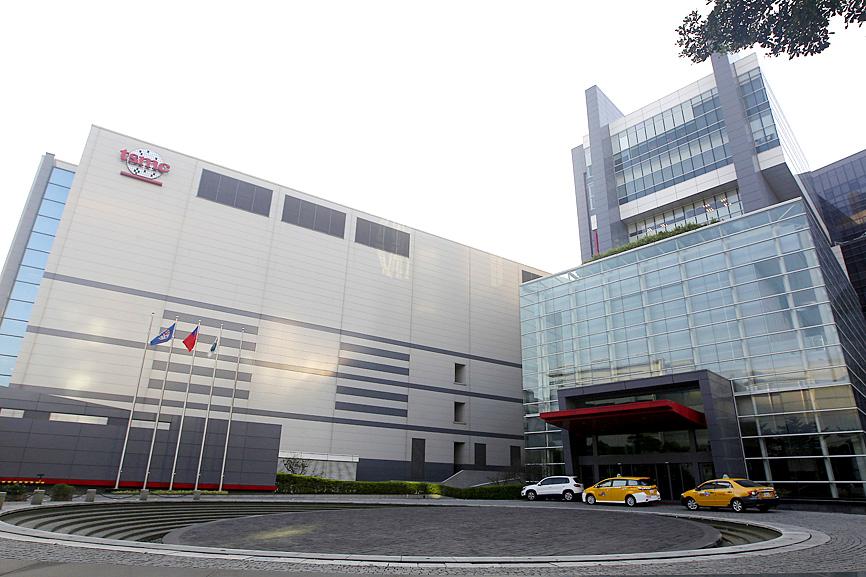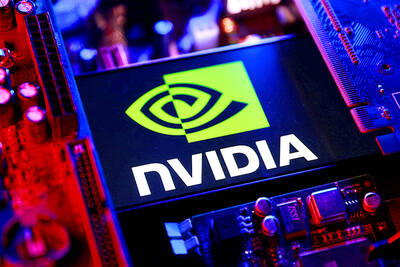Silicon Saxony, a semiconductor cluster in Dresden, Germany, has touted its strength as a technology hub as Taiwan Semiconductor Manufacturing Co (TSMC, 台積電) considers the possibility of building a plant in the European country.
Silicon Saxony chief executive officer Frank Bosenberg told the Central News Agency that his association has transformed itself into one of the five largest semiconductor clusters in the world and has become a competitive investment destination.
Bosenberg did not comment on the speculation that TSMC, the world’s largest contract chipmaker, might choose Dresden as the base for its investments in Germany.

Photo: Pichi Chuang, Reuters
He said Silicon Saxony is highly capable of developing chips for emerging application use, including automotive electronics and 6G communications.
Dresden is home to the largest semiconductor cluster in Europe, with tech giants such as contract chipmaker GlobalFoundries Inc, automotive electronics chipmaker Infineon Technologies AG and auto parts supplier Robert Bosch GmbH forming Silicon Saxony.
In an annual general meeting on July 26, TSMC chairman Mark Liu (劉德音) said that the company is considering the possibility of setting up a production base in Germany, but added that discussions were still at an early stage.
Liu said TSMC has been communicating with its customers in Germany to find out whether such an investment would benefit them.
Bosenberg said that automotive electronics chips have served as a driving force in Silicon Saxony’s development, while several automakers, including BMW AG, Volkswagen AG and Porsche AG, have production facilities nearby.
In addition, 6G communications, robotics, the Internet of Things, quantum computers and software have also become a focus of Silicon Saxony’s research and development efforts, he said.
Several major companies, including GlobalFoundries, Infineon, Bosch, Carl Zeiss AG and Vodafone Group PLC, have invested in the past four years or said they would invest over the next 16 months in Silicon Saxony, with a combined 8 billion euros (US$9.4 billion), Bosenberg said.
TSMC has said it is also considering expanding its investments in the US and Japan to meet strong demand from its customers in those markets.
Ray Yang (楊瑞臨), a supervisor at the Industrial Technology Research Institute’s (工業技術研究院) Industrial Economics and Knowledge Center, said TSMC’s investments in Japan and Germany are likely to differ from its investments in the US.
Unlike a planned facility to be built in Arizona that would use the 5-nanometer process, TSMC’s plants in Japan and Germany are expected to use specialty processes, which would cater to automakers in the two markets, Yang said.
The company is expected to directly supply chips to customers in Japan such as Sony Corp, which manufactures sensors for auto production, he said.
Automotive electronics are expected to become mainstream for semiconductor development over the next few years, following 5G applications and high-performance computing devices, he said.

POWERING UP: PSUs for AI servers made up about 50% of Delta’s total server PSU revenue during the first three quarters of last year, the company said Power supply and electronic components maker Delta Electronics Inc (台達電) reported record-high revenue of NT$161.61 billion (US$5.11 billion) for last quarter and said it remains positive about this quarter. Last quarter’s figure was up 7.6 percent from the previous quarter and 41.51 percent higher than a year earlier, and largely in line with Yuanta Securities Investment Consulting Co’s (元大投顧) forecast of NT$160 billion. Delta’s annual revenue last year rose 31.76 percent year-on-year to NT$554.89 billion, also a record high for the company. Its strong performance reflected continued demand for high-performance power solutions and advanced liquid-cooling products used in artificial intelligence (AI) data centers,

SIZE MATTERS: TSMC started phasing out 8-inch wafer production last year, while Samsung is more aggressively retiring 8-inch capacity, TrendForce said Chipmakers are expected to raise prices of 8-inch wafers by up to 20 percent this year on concern over supply constraints as major contract chipmakers Taiwan Semiconductor Manufacturing Co (TSMC, 台積電) and Samsung Electronics Co gradually retire less advanced wafer capacity, TrendForce Corp (集邦科技) said yesterday. It is the first significant across-the-board price hike since a global semiconductor correction in 2023, the Taipei-based market researcher said in a report. Global 8-inch wafer capacity slid 0.3 percent year-on-year last year, although 8-inch wafer prices still hovered at relatively stable levels throughout the year, TrendForce said. The downward trend is expected to continue this year,

‘BASICALLY A BAN’: Sources said the wording governing H200 imports from officials was severe, but added that the regulations might change if the situation evolves Chinese customs authorities told customs agents this week that Nvidia Corp’s H200 artificial intelligence (AI) chips are not permitted to enter China, three people briefed on the matter said. Chinese government officials also summoned domestic technology companies to meetings on Tuesday, at which they were explicitly instructed not to purchase the chips unless necessary, two of the people and a third source said. “The wording from the officials is so severe that it is basically a ban for now, though this might change in the future should things evolve,” one of the people said. The H200, Nvidia’s second-most powerful AI chip, is one

A proposed billionaires’ tax in California has ignited a political uproar in Silicon Valley, with tech titans threatening to leave the state while California Governor Gavin Newsom of the Democratic Party maneuvers to defeat a levy that he fears would lead to an exodus of wealth. A technology mecca, California has more billionaires than any other US state — a few hundred, by some estimates. About half its personal income tax revenue, a financial backbone in the nearly US$350 billion budget, comes from the top 1 percent of earners. A large healthcare union is attempting to place a proposal before